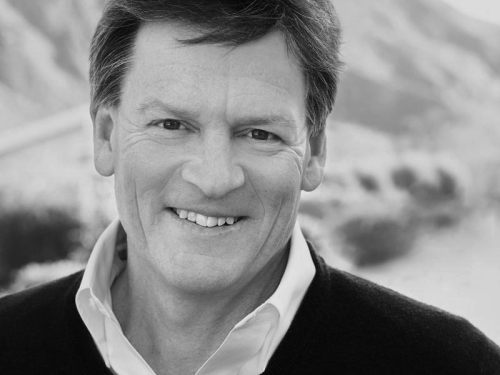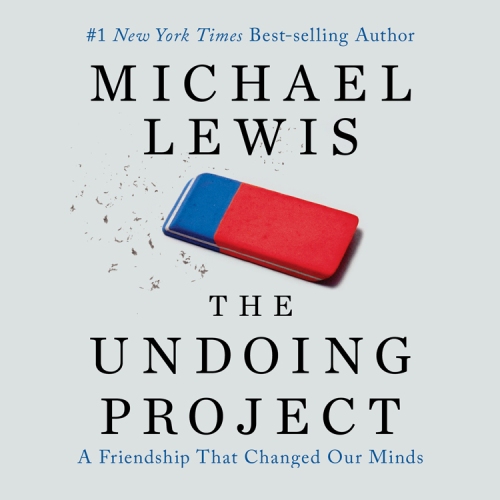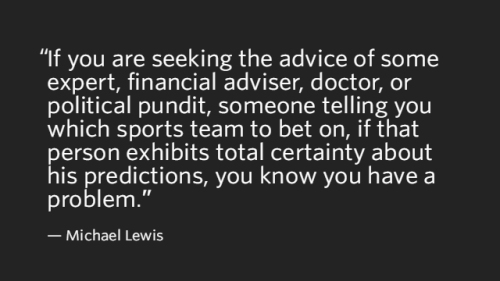Link received 27/12/2016 at 3:21 p.m.
Message: A lesson for some Dunedin ‘luminaries’ perchance?
It’s amazing how resistant, particularly powerful men, are to people coming from outside and giving them advice on how to make decisions.
—Michael Lewis
RNZ National
Trust your gut? Think again
From Nine To Noon with Kathryn Ryan, 10:09 am on 21 December 2016
[Abridged.] Michael Lewis is one of the most famous non-fiction writers in America. He has written 14 books, edited one and is a regular contributor to Vanity Fair. His books include the global best-selling Flash Boys – an expose of high speed scamming in the stock market; The Big Short: Inside the Doomsday Machine – an account of shady financial transactions and accounting that led to the 2008 global financial meltdown and on which the film The Big Short was based and Moneyball, the story of a maverick outsider who beat the system.
Lewis’s new book is called The Undoing Project in which he profiles the professional and personal relationship between the behavioural psychologists Daniel Kahneman and Amos Tversky. Kahneman and Tversky’s work shed new light on how humans make decisions when faced with risk and uncertainty. They established that we generally trust our gut instinct, over the evidence, to guide our decision-making.
Lewis says he came across Kahneman and Tversky after writing Moneyball. He says the two were very different personalities and that made for the perfect team.
“They sensed in the other something they wished they had. Kahneman is an unbelievable creative mind he really has a mind more like a poet or a novelist filled with these flashing insights about human nature. Tversky wanted to be a poet but he has a scientific, logical mind. He’s a brilliant logician.”
The two decide to come together and study how the human mind works. That work became an examination of human fallibility – the weakness of the human mind. They designed experiments to show how our mind plays tricks on us.
One they stumbled on was a phenomenon they called anchoring that skews human decisions. They also established that we are terrible at assessing risk – we rate risk based on what’s most memorable which tends to be what happened most recently.
“People long for the world to be a far more certain place than it is, instead of dealing with uncertainties they tell stories that make it seem much more certain and respond to stories that make it seem much more certain than it is. A politician speaking in certain terms as if he’s infallible has weirdly an advantage – even though we shouldn’t believe him. We’re very vulnerable to people who simulate certainty.”
Lewis is unsure whether this inbuilt fallibility can be fixed.
“I hate to sound fatalistic but one of the big takeaways from [Kahneman and Tversky’s] work is just how hard it is to correct for human fallibility – they equate cognitive illusion with optical illusion.”
Read more
█ Audio | Download: Ogg MP3 (26′07″)
—
Michael Monroe Lewis (born Oct 15, 1960) was born in New Orleans to corporate lawyer J. Thomas Lewis and community activist Diana Monroe Lewis. He attended the college preparatory Isidore Newman School in New Orleans. He then attended Princeton University where he received a BA degree (cum laude) in Art History in 1982 and was a member of the Ivy Club. He went on to work with New York art dealer Daniel Wildenstein. He enrolled in the London School of Economics, and received his MA degree in Economics in 1985. Lewis was hired by Salomon Brothers and moved to New York for their training program. He worked at its London office as a bond salesman. He resigned to write Liar’s Poker and become a financial journalist. A contributing editor to Vanity Fair since 2009. More at Wikipedia.
Vanity Fair – Hive: Politics
█ Donald Trump and the Rules of the New American Board Game
By Michael Lewis Dec 18, 2016 7:00 pm
While volunteering at his daughter’s new high school, Michael Lewis watched kids of all races and backgrounds react to Trump’s election with a peaceful demonstration of their grief and fear. It inspired a game he’s devised for thinking about the future. Link
Vanity Fair – Hive: Politics
█ Obama’s Way
By Michael Lewis Sep 11, 2012 6:12 pm
To understand how air-force navigator Tyler Stark ended up in a thornbush in the Libyan desert in March 2011, one must understand what it’s like to be president of the United States—and this president in particular. Hanging around Barack Obama for six months, in the White House, aboard Air Force One, and on the basketball court, Michael Lewis learns the reality of the Nobel Peace Prize winner who sent Stark into combat. Link
—
Posted by Elizabeth Kerr
This post is offered in the public interest.
*Image: Michael Lewis by Tabitha Soren / W.W. Norton Company
blackwhite by whatifdunedin



